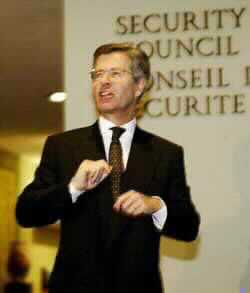- Author:
& News Agencies - Section:
WORLD HEADLINES
Chirac, Putin Have Reservations Over U.N. Iraq Text

HIGHLIGHTSFrance & Russia Want Certain Ambiguities in the U.S. Need to Be Cleared|| U.S. New Text Has One Improvement: 'Stressing UN Key Role'|| Any Risk of Automatic Recourse to Force Has to Be Excluded if Unanimity is Required|| Washington Intends to Bring Draft to a Vote Friday||STORY:France and Russia, opposed to any blank check for military action against Baghdad, voiced reservations over a draft resolution which Washington presented to the United Nations on Wednesday on the disarming of Iraq.
French President Jacques Chirac spoke to Russian President Vladimir Putin by phone and both agreed there were "ambiguities" on the issue of military action in the text, which Washington wants put to a vote on Friday, Chirac's spokeswoman said.
Chirac and Putin exchanged views on the document and felt progress had been made on many fronts, spokeswoman Catherine Colonna told reporters.
"Certain ambiguities need to be cleared up, however," she said, describing what was said by the two men, whose countries have veto power in the 15-member U.N. Security Council along with China, Britain and the United States.
Chirac in particular believed "there would be advantages to a resolution which was adopted unanimously," Colonna said. "That would require that any risk of automatic (recourse to force) would therefore have to be excluded," she said.
Chirac and Putin believed that one of the main improvements in the new U.S. text was that it confirmed the key role of the United Nations in dealing with Iraq, she added.
TWO-STEP APPROACH
Paris has doggedly argued for a two-step approach, where U.N. inspectors would be sent into Iraq on a disarming mission and military action only considered at a later stage if problems arose, and that such a move would need fresh U.N. consultations.
Washington's top U.N. envoy, John Negroponte, told reporters the United States intended to bring the draft resolution to a vote in the U.N. Security Council on Friday.
Concerning fears the draft might contain "hidden triggers" enabling the United States to launch military strikes and then maintain they had U.N. authorization, he said President Bush had made it clear "war would be a last resort."
The new U.S. text -- the third to be drafted following objections from France, Russia and China -- requires weapons inspectors to report to the Security Council any failure by Iraq to meet its obligations to disarm.
It threatens Iraq with "serious consequences" and says that failure to comply would constitute a "further material breach" of accords ending the 1991 Gulf War -- a phrase which could be interpreted as a license to use force.
Russia and France were apparently keen to restate their fears about automatic military action while keeping up a sense of goodwill as U.N. negotiations headed for the crunch.
Speaking before the text was tabled, Russian Deputy Foreign Minister Yuri Fedotov, a senior spokesman on Iraq, told Itar-Tass news agency the draft contained "several additional steps which take into account Russia's position."
Moscow, like France, has repeatedly called for the fastest possible return of U.N. arms inspectors to determine whether Iraq holds dangerous weapons.
Fedotov added: "We still believe it is vital that the new resolution contain no automatic mechanism in using force."
French Foreign Minister Dominique de Villepin told France's lower house of parliament progress had been made on Paris's key demand for a two-step strategy, and that France had "very wide backing among members of the Security Council" in its opposition to anything allowing automatic recourse to military force.
PHOTO CAPTION
French Ambassador to the United Nations Jean-David Levitte arrives for Security Council consultations at the U.N. November 6, 2002. France and Russia said a revised U.N. draft resolution on disarming Iraq had moved closer to their own positions and stressed their strong opposition to any automatic recourse to military action. (Peter Morgan/Reuters)


 Home
Home Discover Islam
Discover Islam Quran Recitations
Quran Recitations Lectures
Lectures
 Fatwa
Fatwa Articles
Articles Fiqh
Fiqh E-Books
E-Books Boys & Girls
Boys & Girls  Women
Women









